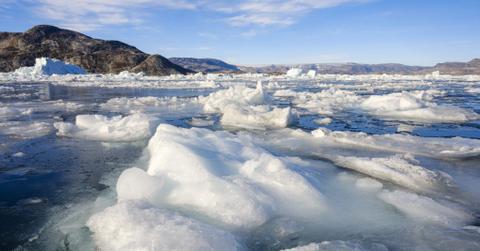Covid 2.0? Arctic 'Zombie Viruses' Poised to Be Released as Climate Change Heats Up, Scientists Warn

The first sea ice of the fall-winter develops off east Greenland.
Feb. 9 2024, Published 12:31 p.m. ET
Could the next COVID-19-like pandemic be hidden in the frozen tundra of Siberia, just waiting for the thaw of a changing climate?
Some European scientists are concerned about "zombie viruses" lying dormant in Arctic regions, poised to be unleashed by the impact of climate change.
Contrary to the conventional belief that pandemics originate in tropical areas, attention is now drawn to "Methuselah microbes," ancient organisms thriving in the past and sealed beneath permafrost.
French geneticist Jean-Michel Claverie challenges the prevailing notion, stating, "Little attention has been given to an outbreak that might emerge in the far north and then travel south."
Dutch virologist Marion Koopmans adds weight to the concern, expressing the real risk of these microbes triggering diseases, such as an ancient form of polio.
Claverie, with firsthand knowledge of the dangerous microbes in the cold, led a team a decade ago that isolated buried viruses in Arctic Russia. While the viruses isolated then posed no immediate threat to humans, Claverie emphasizes the possibility of other viruses capable of causing illnesses.
A 2023 study identified seven locations in Siberia harboring various zombie viruses, including traces of herpes and poxes. Although the viruses isolated were deemed non-threatening to humans, the potential for other viruses to induce illnesses remains a concern.
To address these worries, a group of scientists has established an "Arctic monitoring network," as reported by The Guardian.
This initiative, part of the University of the Arctic academic network, aims to detect and prevent the release of diseases from the Arctic. The project includes quarantine measures to contain outbreaks should they occur.
The melting permafrost in regions like Alaska and Canada, compounded by the receding sea ice in the Arctic, raises alarm bells.
Never miss a story — sign up for the Front Page Detectives newsletter. Be on the scene the moment news breaks.
Plans for extensive mining operations, accompanied by increased ship traffic, could potentially expose miners to released viruses. Claverie warns that mining activities, puncturing deep permafrost to extract oil and ores, may lead to the release of harmful viruses.
With concerns about the Arctic Sea losing all its ice by 2040 due to ongoing weather trends, scientists stress the urgency of monitoring and mitigating potential risks. The recent Mpox outbreak, formerly known as monkeypox, was attributed to human development and urbanization in Africa, according to Koopmans.
In a related discovery, research indicates that methane trapped under permafrost poses an additional threat if released, intensifying the dangers of climate change.
Become a Front Page Detective
Sign up to receive breaking
Front Page Detectives
news and exclusive investigations.
